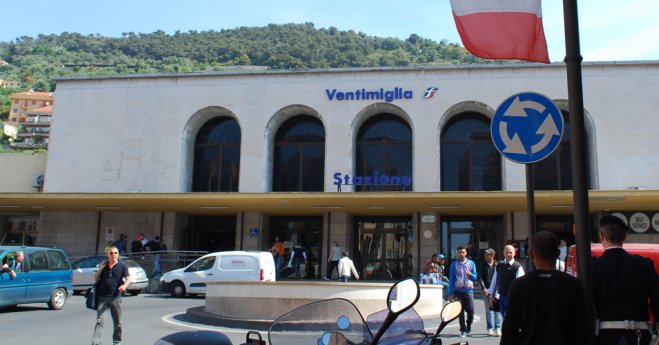The fact is, Ventimiglia is a place almost nobody wants to travel to. This town of 25.000 inhabitants, which is located on the Italian Riviera stands in the shadow of more prominent seaside resorts such as San Remo and St. Tropez. Yet Venimiglia has made headlines because too many people come here. Too many people who have already been a long time on the road and who want to carry further on: mostly migrants from North Africa on their way to France where many of them have relatives.
Ventimiglia is the last Italian town before the French border and one through which every traveler has to go since the Alps and Medittereannean block every other way: the town lies indeed by the Marseille - Genoa highway. Trains depart here from the small station and head for illustrious cities like Cannes, Nice and a few long-distance trains drive up to Milan. There is even a train from Rome in the evening, at around 23:15. This train has become a problem according to some people, for migrants come along with it.
Harmful scaremongering
« At the moment there are relatively few migrants here, but in the weeks around Easter, the station square was just packed. », says the owner of a press shop situated in the station. According to him, even though most migrants travel further to France, the situation is « disastrous » for the town and its reputation. For him this crisis has an impact on tourism: « There are just fewer Italians who come here » and people say the number of migrants in Ventimiglia parallels the number of new-comers in Lampedusa. He also complains about the news coverage: « the media were a part of the problem too and have partially blown the situation out of proportion » This is also the reason why many inhabitants in Venimiglia do not readily give out their name to journalists.
Berlusconi calls the migrants a « human tsunami »
The waves of migrants have made impression on the shop’s owners of Ventimiglia station, but not only. The Italian government has found itself rapidly overstrained by the migrants who have fled during this Spring’s revolutions in North Africa and whose flight was not impeded any more by the local authorities. Prime Minister Silvio Berlusconi declared shortly after the earthquake in Japan, and with little subtlety, that the migrants were a « human tsunami », a natural disaster as it were. His Foreign Minister, Franco Frattini, gave warning against an « exodus of Biblical dimension ».
Italy gave the refugees temporary residence permits that authorize them to travel out of Italy, against the will of its European partners. The situation quickly escalated: France reinstated border controls and shut the rail connection between Venimiglia and its French neighbour town of Menton, what led in turn to cries of outrage on the Italian side.
The Italian government demanded at the same time « solidarity » from the other European countries, meaning the spreading of refugees across Europe. The number of migrants has dramatically risen. While 159 boats and 4.406 migrants arrived on the Italian coasts in 2010, the number already reached 507 boats and 42.807 migrants only for the first five months of 2011, says Sonia Viale, Undersecretary at the Ministry of the Interior. Despite this rise in the immigration numbers, Italy’s request was met with a point-blank refusal in Northern Europe: German Minister of the Interior Hans-Peter Friedrich stated in Die Welt: « Italy must sort out its problems with refugees by itself ».
Italy is not going to be overrun by immigrants
The question whether Italy is actually overstrained by immigrants is also criticized inside the country. Anna Rossi is the head of the CGIL Union - the bureau for refugees – in Bologna, the capital of the Emilia-Romagna region, about 300 kilometers east of Ventimiglia. She and her colleagues provide help for everyday problems and authority procedures. The waiting room of their small office is crammed with wooden tables, many of the people waiting come from North Afrika, a few of them from Southeastern Europa and Eastern Asia. Most of them are young men, a few women sit by their prams, there is hardly any older men. Information is displayed in many different languages, like Chinese, Urdu and Russian. And of course in Arabic too.
« We’re facing an usual situation », says this determined union worker. But is this a state of emergency? « No, it’s not », she answers resolutely and then proceeds to talk of the figures: there are less refugees living in Italy than in other European countries: about 55.000, that is to say, around 1 refugee for every 1000 inhabitants. The number reaches 3 refugees for 1.000 inhabitants in France, 5 in Great Britain and 7 in Germany. « Why then should Germany take migrants? The share of migrants in Italy is substantially smaller than in other countries ». There has been many more refugees coming in Italy in the past without enforcing a state of emergency.
« There’s absolutely no human tsunami », Anna Rosa Rossi adds. The government’s declarations make sense but for a totally different reason: because of the election campaign. « The alien invasion, that sounds like the locust invasion from the Old Testament ». Berlusconi and his coalition partners, the right-wing populists from the Lega Nord, use this expression to be perceived as immigration hard-liners to the detriment of the migrants. « The policy of immigration scare, of terrorist immigrants for instance, is very successful in Italy », says Anna Rosa Rossi.
European States at odds
This dispute between Italy and France over border control is also the consequence of right-wing populist policies from both countries, this left-wing union member reckons. Although the migrants were granted temporary residence authorization to travel onto its territory, France subsequently demanded them to produce evidence of their ability to sustain themselves on their own. If they fail to produce such evidence in the form of sufficient financial means, they must leave France and be deported back to Italy.
Italy reacted in a very similar way one year ago, but in the opposite situation. « A year ago, when there was an immigration state of emergency in France, Italy said no. » That is why it casts a critical eye on Italy’s call for European solidarity, for solidarity is not one-way only. If every country tries to deport the migrants and relocate them elsewhere, how can we reach a comprise? « Cooperation works when you take on your share ». Harsher laws will not stop immigration anyway, especially since many immigrants fear for their lives in their home countries because of a dire economic situation or violence. And so we will not achieve long-term management of immigration through an increase in border controls or in the number of detention centres, but rather thanks to a serious integration offer, like language courses for example.
The Italians themselves do not feel like they are being overrun by migrants. Not even the inhabitants of Ventimiglia. « The migrants? They’re quite shy and undisturbing. Most of them remain in the vicinity of the station. You hardly even notice them. », says a café worker, apparently without noticing that her working place itself is only a few hundred meters away from the train station.


Follow the comments: |
|
